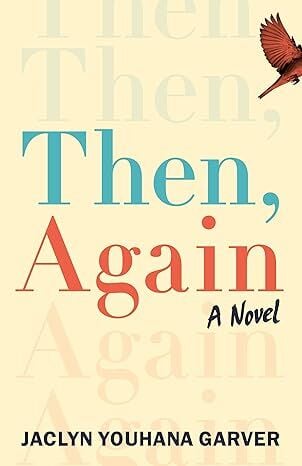°®¶¹appThen, Again,°®¶¹app the debut novel by Fort Wayne°®¶¹apps Jaclyn Youhana Garver, is a book full of big ideas and small, telling moments, perhaps best encapsulated here:
°®¶¹appThat°®¶¹apps what it°®¶¹apps like, the days after you graduate from high school. Everything is possible, simultaneously. Every idea is a good idea, even if it°®¶¹apps a terrible one. You don°®¶¹appt even recognize it as °®¶¹apphope°®¶¹app °®¶¹app it°®¶¹apps just the way things are. It°®¶¹apps only life, and the idea that it could be fleeting is foreign, hieroglyphics in the dark corner of a cave you can°®¶¹appt even see, let alone translate.°®¶¹app
The woman in whose head these thoughts reside is Asha Khoury, whose life we watch unfold across three distinct time periods: her adolescence in the late 1990s, the year following college (2006) and the present day (2017).
That last date is significant, Garver says, because it°®¶¹apps the year in which she spent three months writing her first draft of °®¶¹appThen, Again.°®¶¹app (Full disclosure, Garver is a Journal Gazette alum; she was a reporter in the features department from 2008-13).
It took seven years and °®¶¹appmany revisions,°®¶¹app she says, for that initial draft to be crafted into the novel that debuted on Tuesday. Garver°®¶¹apps previous publications include a book of poetry, °®¶¹appThe Men I Never:,°®¶¹app and the story °®¶¹appThe Butterfly Collector°®¶¹app in the collection °®¶¹appThe World Belongs to Us.°®¶¹app
Garver°®¶¹apps narrative deftly employs the technique of time-hopping. We see in alternating chapters how decisions regarding Asha°®¶¹apps first teenage love, Jason, inform her thoughts and actions regarding her husband, Charlie. Most importantly in the context of the storyline, those thoughts inform Asha°®¶¹apps decisions regarding the coma that has subsumed Charlie by 2017.
°®¶¹appI once read somewhere that who we are in eighth grade is basically the same person we are as adults,°®¶¹app Asha tells us at the start of the story. °®¶¹appI think about that a lot.°®¶¹app
As do we while we follow Asha, accompanied by her always-reliable BFF Bridget, through the intersecting timelines of her life. The story takes place in and primarily around the outskirts of Cincinnati, where Garver spent her formative years.
Implied by the title, one of the themes °®¶¹appThen, Again°®¶¹app explores is whether first love endures. It°®¶¹apps Charlie who tells Asha: °®¶¹appIt doesn°®¶¹appt matter if millions of people on the planet fall in love every day °®¶¹app each falling is extraordinary. It°®¶¹apps its own tiny macrocosm with its own life forms and pulse.°®¶¹app (See °®¶¹app¦ big idea/small, telling moment.) But his words ring as true for the Asha/ Jason relationship as they do for the Asha/Charlie marriage.
While the conclusion of °®¶¹appThen, Again°®¶¹app is not definitive, Garver has sprinkled enough clues, right up until the final page, to allow readers to paint their own mental picture of how Asha carries on once we close the book for the final time. By that point, you°®¶¹appll be invested enough in this intriguing woman to want to envision that future for yourself.
Over lunch, Garver shares that she did not have a specific ending in mind as she wrote. Nor did she employ any sort of timeline/outline to keep track of the progression of Asha°®¶¹apps life as the author jumped around among her main character°®¶¹apps various stages. She likens the process to driving at night and simply °®¶¹appfollowing the headlights.°®¶¹app
As Asha herself tells us: °®¶¹appTime is linear, but sometimes we circle back again, don°®¶¹appt we?°®¶¹app
Garver also says she maintains a deep connection to her characters that endures even as she leaves them on the printed page. For the novel she°®¶¹apps currently writing, Garver says she recently bought a gift for one of the characters because she knew the bloodstone would be something that character would appreciate.
In °®¶¹appThen, Again,°®¶¹app no detail °®¶¹app the letter, the locket, Jason°®¶¹apps knuckle-cracking °®¶¹app is insignificant, and no words are wasted. Moments of deep introspection occur alongside moments of high comedy, and it all works °®¶¹app¦ not because it is true to life, but because it is life.
Keith Elchert is copy editor of °®¶¹app°®¶¹apps editorial pages.





